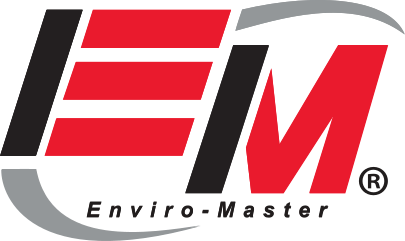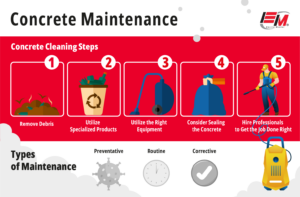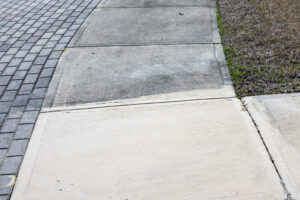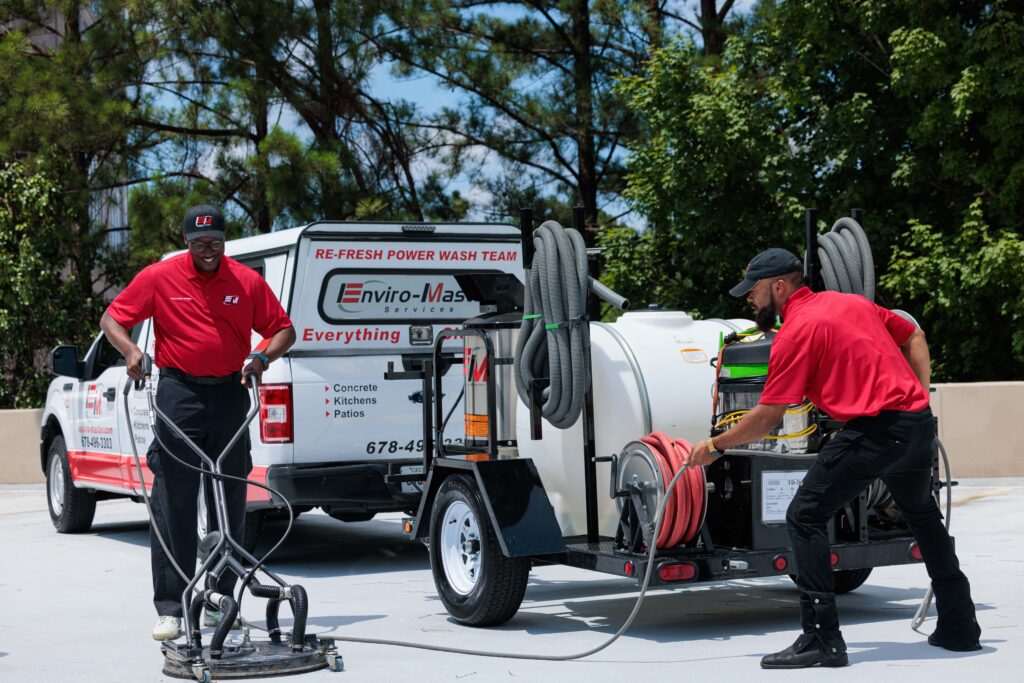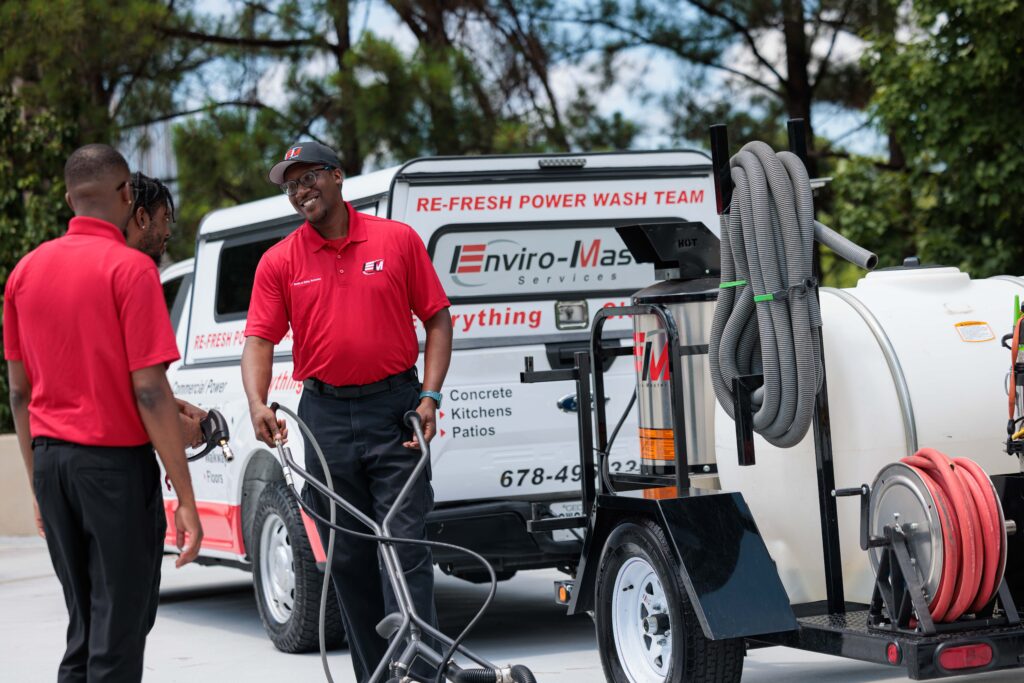At first glance, concrete surfaces such as concrete sidewalks and driveways may seem pretty resistant to stains. In reality, concrete flooring is a highly porous material that can become stained quite easily without proper maintenance. From rust marks to erosion due to harsh chemicals or water damage, plain concrete and decorative concrete can both be susceptible to a wide range of damage when property owners skip out on basic maintenance – ultimately harming a business’s curb appeal.
To avoid unsightly stains and costly concrete repair bills, regular maintenance is the key. In this blog, we’ll cover everything you need to know about concrete maintenance and stain removal, including how to choose concrete maintenance services.
Types of Concrete Maintenance
When putting together a maintenance program for your property’s concrete surfaces, there are several different types of concrete maintenance to consider for best results, including preventive, routine, and corrective maintenance:
Preventive Concrete Maintenance
While it requires some elbow grease, preventive concrete maintenance is designed to prevent issues from occurring and save property owners time and money down the road. Coating a concrete floor with a concrete sealer that will help protect the surface from stains and erosion is one example of preventive maintenance is recommended that the sealer should be applied once per year. If you live in a colder climate, you may need to apply concrete sealer even more frequently.
Routine Concrete Maintenance
Routine concrete maintenance can go a long way toward keeping your concrete slabs clean and attractive while also helping prevent damage. One important type of routine concrete maintenance that property owners can’t afford to overlook is pressure washing. In addition to helping remove unsightly dirt and clean stains, routine pressure washing can also help prevent concrete damage. This is because the buildup of oil, mold, and other debris can erode away concrete surfaces and damage their integrity if not addressed.
Corrective Concrete Maintenance
Corrective concrete maintenance is intended to fix issues as they happen. Crack repair and stain removal are the most common examples of corrective concrete maintenance. Cracks in concrete can typically be repaired using a concrete crack filler, however, even small, hairline cracks in a concrete driveway or other concrete surfaces can still be costly and time-consuming to repair. Years’ worth of stains also pose a major issue for your curb appeal. These factors make it important to prioritize preventive and routine concrete maintenance to minimize the amount of corrective concrete maintenance you are required to perform.
Addressing Concrete Stains
Concrete slabs are susceptible to many different stains, and the procedure for how to clean stains from concrete depends on the type of stain that you are dealing with. Along with discussing why concrete tends to stain, we’ll take a look at the various types of stains that concrete surfaces are susceptible to and how they should be addressed.
Why Concrete Tends to Stain
If you look closely at a concrete surface such as your sidewalk or restaurant patio, you’ll notice that concrete is a very porous material. This means that concrete is extremely absorbent and is susceptible to numerous types of stains. Concrete sealer and routine pressure washing can both help prevent these concrete stains from occurring. If left unaddressed, spills and debris buildup can create permanent stains that are difficult to remove.
Oil and Grease
Oil and grease are capable of breaking through concrete sealer if they are not cleaned up right away. To make matters worse, you can’t count on heavy rainfall to wash away oil and grease buildup since oil is not water-soluble. Pressure washing with warm water, however, has enough force to wash away oil and grease buildup – especially if you mix in a heavy-duty solution designed for breaking down oil and grease. These solutions typically include oxalic acid, muriatic acid (hydrochloric acid), and citric acid which is commonly found in lemon juice.
Dirt and Foliage
Along with being unsightly, a buildup of dirt and foliage on your concrete surfaces can cause permanent stains if it is not cleaned away quickly enough. Dirt can seep into the concrete, and the tannins found in foliage can likewise seep through the surface and cause reddish-brown stains. Dirt and foliage buildup is typically quite easy to wash away with cold water using a pressure washer or even a garden hose.
Paint
The entire purpose of paint is to permanently change the color of surfaces, and if it is accidentally spilled on concrete or worse, used to vandalize your property, then that it is there to stay. After a spill or discovering graffiti, you will want to remove as much paint as possible before it has the chance to dry. From there, you can use a paint stripper to remove the rest. Just be sure to wash the concrete well once you are done since the paint stripper itself can erode concrete if it is left in place.
Rust
Most people assume that rust is only a concern for metal surfaces – and while it’s true that concrete itself won’t rust, it can still form unsightly rust stains if it is exposed to a rusted metal such as a piece of rebar. The first step to preventing concrete rust stains on your surfaces is to remove any metal debris as quickly as possible. If a stain has already formed, you should be able to remove most of the rusted surface using either white vinegar or a powerful pressure-washing solution.
Bird Droppings
Along with being one of the most unpleasant types of buildup, bird droppings can stain concrete if they are not cleaned away quickly enough. This is due to the uric acid found in bird droppings, which not only causes stubborn stains but can also deteriorate concrete over time. To prevent this, be sure to use a pressure washer to wash away bird droppings anytime you notice a buildup.
Mold and Mildew
Mold produces compounds designed to break down the surface that it attaches to so that it can be absorbed by the fungus. Along with causing stains, these compounds can also erode the surface of your concrete and create permanent damage. You can clean away mold from concrete surfaces using a pressure washer. For added effectiveness, you may also want to consider mixing in a mold-killing detergent or cleaning solution with trisodium phosphate.
Maintaining Your Business’s Concrete Surfaces
Any business with exterior concrete surfaces such as concrete walls, driveways, walkways, or patios needs to create a plan for maintaining those surfaces. This includes businesses such as gas stations, shopping centers, restaurants, truck stops, and countless others.
One major reason for maintaining your business’s concrete surfaces is boosting your business’s curb appeal. If stained, dirty concrete is the first thing potential customers see when passing by your business, they aren’t going to be very encouraged to stop and come inside. Exterior surfaces that are clean and well-kept, on the other hand, are much more inviting.
Of course, routine and preventive concrete maintenance can also prevent costly repairs down the road. By using a high-quality concrete sealer and routinely washing away any buildup or debris, you can go a long way toward preventing erosion, cracks, and other unattractive, expensive-to-fix issues.
General Concrete Cleaning Steps
If you would like to leave your business’s concrete surfaces as clean as possible, here are the concrete cleaning steps that you should follow:
1. Remove Debris
Cleaning concrete starts with removing any debris buildup. The easiest way to do this is to use a pressure washer. If the concrete surface is relatively small and within reach, though, you may be able to get away with using a broom instead.
2. Utilize the Right Cleaner
The type of cleaning chemical you should use to clean concrete depends on the type of stain or buildup you are dealing with. Cleaning products with an Alkaline active ingredient, for example, are ideally suited for removing oil, grease, and dirt an acidic solution is better for removing stubborn rust stains and mineral deposits. Make sure to follow proper safety precautions such as protective gloves, a face shield, and eye protection while working with chemical cleaners. If you are cleaning an indoor surface, meanwhile, you may wish to use a milder cleaning solution such as a PH-neutral cleaner or an enzymatic cleaner so that having a well-ventilated area isn’t as much of a concern.
3. Utilize the Right Equipment
A high-quality pressure washer is the most indispensable piece of equipment when it comes to cleaning and maintaining concrete. For surfaces such as floors and walkways, though, you can also use a mechanized scrub brush.
4. Consider Sealing the Concrete
As we’ve already mentioned, concrete sealers can be highly effective at preventing both major and minor stains and erosion. While it’s still vital to clean your concrete regularly even if you do apply sealer, a good sealer can provide you with a lot of leeways when it comes to how quickly stains and erosion form.
5. Hire Professionals to Get the Job Done Effectively
Properly cleaning concrete surfaces requires a combination of the right equipment, the right cleaning solutions, and plenty of experience. If you want to make sure that the job is done right and your business’s concrete surfaces are protected, working with a professional concrete cleaning service is your best bet. Hiring professionals for your commercial rust remover needs ensures that the best products and methods available will be employed while also eliminating the burden of having to do it yourself.
Enviro-Master’s Re-Fresh Power Washing Service is Key to Clean & Safe Concrete
At Enviro-Master, we help business owners across the country keep their concrete surfaces clean via our industry-leading Re-Fresh Service. Thanks to the power of The Tank – our proprietary, high-strength grime remover – we are able to quickly wash away even the most stubborn buildup and debris, leaving your concrete surfaces as spotless as the day they were poured.
Best of all, our Re-Fresh Service is both environmentally friendly and cost-effective. If you would like to learn more about partnering with Enviro-Master for your business’s concrete maintenance needs, be sure to contact us today!
